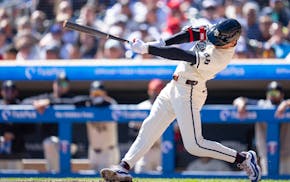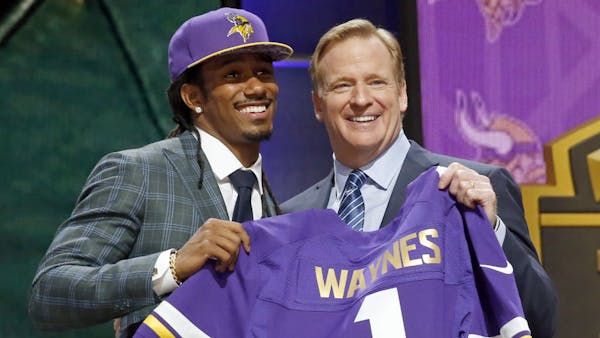The first round of the 2015 NFL draft proved that if you're going to have character issues in today's NFL, you better be the best quarterback on the board.
Otherwise, good luck. You're going to tumble through or out of the first round. Or you could be LSU offensive tackle La'el Collins and be staring at the probability of going from a first-rounder to out of the draft entirely as police investigate the murder of your pregnant ex-girlfriend, even though you're not currently a suspect.
"I think there's a more heightened awareness [of character concerns]," Vikings General Manager Rick Spielman said Thursday night. "I think you're just more conscientious that you're trying to get the best people in here possible."
Of course, the NFL draft is all about risk vs. reward. The tough talk about character has its boundaries. If you're Tampa Bay and you need the best quarterback at No. 1 overall, you select Florida State's Jameis Winston based on talent, try to convince the world that you're comfortable with the character and immaturity red flags and leave the allegedly squeaky clean Marcus Mariota on the board for Tennessee to take at No. 2.
Winston's most serious character issue involved being investigated — but not charged — for rape. He has been sued by the woman in the case and has had to answer questions about less serious juvenile behavior such as stealing crab legs at a restaurant.
Winston didn't attend the draft in Chicago. After the year NFL Commissioner Roger Goodell had last year dealing with player misconduct issues and his multiple missteps in trying to deal with them, it's probably a good thing he didn't have to kick off 2015 by hugging Winston.
As the draft unfolded, it was obvious that teams were less willing to deal with character issues.
Nebraska defensive end/outside linebacker Randy Gregory? Still on the board.
Considered by multiple general managers to be a top-five talent, Gregory probably will be a second-rounder because teams are worried that his love of marijuana is greater than his love for football.
He failed his drug test at the scouting combine and has had other incidents as well. There also are concerns by some teams when it comes to his psychological testing and whether he can handle what the NFL will throw at him.
"You guys [media] don't have access to the full background work that gets done on guys' characters," said Spielman, who was speaking not about Gregory, but in general terms. "We have psychological testing that we do that we aren't going to share with anyone. So when people look at the draft and say, 'Why didn't they take this guy or that guy?' it's not as simple as that. There are guys you take off your board and say, 'This guy is a character reject, we wouldn't want him in our locker room.' "
Missouri outside linebacker Shane Ray was another player projected to go in the top six to 10 players. He tumbled all the way to No. 23 before the Broncos traded up five spots with Detroit to take him.
Ray said all the right things about giving the Broncos his full effort and attention. But an eyebrow is raised when it's said three days after he's pulled over in Missouri at 5:46 a.m. for speeding and cited for misdemeanor possession of up to 35 grams of marijuana. Not a good sign.
In Collins' case, it could be a case of the worst timing in the history of the draft. He had to leave the draft and return to New Orleans to answer questions in a murder investigation involving a pregnant girlfriend.
Collins isn't a suspect, but he also hasn't been cleared. In other words, he's probably too toxic for any team to touch. He could go from a first-rounder to a college free agent.
Receiver Dorial Green-Beckham probably could have been a first-rounder based on size, speed and skill. But he didn't play last year at Missouri after legal issues with marijuana and allegedly breaking into an apartment and pushing a woman down a flight of stairs.
In his book, "Uncommon Life Daily Challenge," former NFL coach Tony Dungy wrote about facing character issues at draft time. He said the Colts had the initials DNDC (Do Not Draft, Character) next to questionable players.
"Not everyone realizes the importance of character," Dungy wrote. "In the NFL, this kind of mistake in the draft process can eventually disrupt a team, impacting its work ethic and stability. The character of a few affects the well-being of many."
Mark Craig • mcraig@startribune.com

Live: Minnesota United at Charlotte FC. Follow on Gameview.
Jameson Taillon comes off the injured list and helps the Cubs beat the Marlins 8-3
T-wolves take NBA's best defense into series vs. Suns, but can it stop Durant-Booker-Beal trio?

